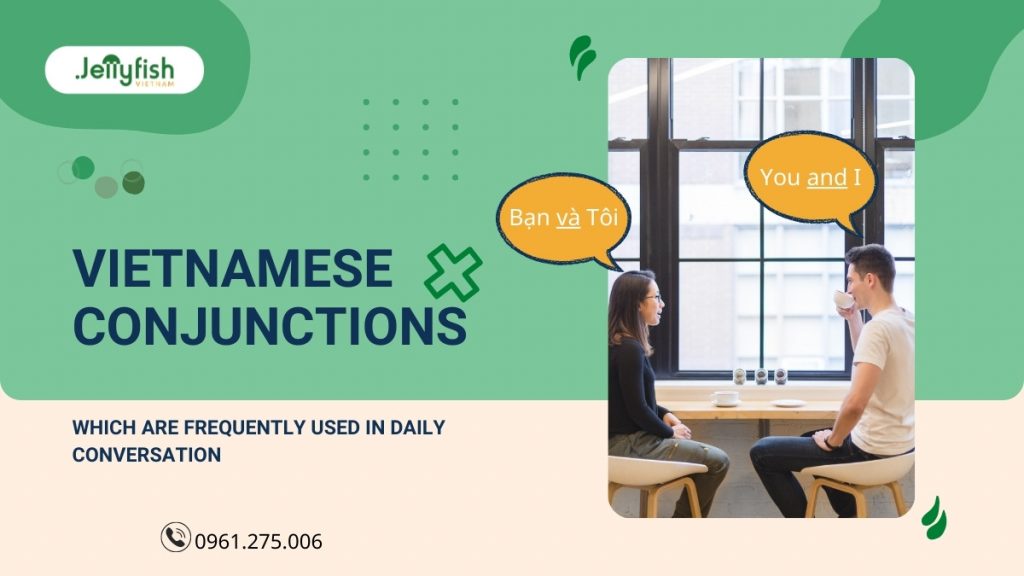Vietnamese conjunctions are used in daily conversations, especially when you are communicating with Vietnamese people. If you do not know how to use them appropriately, you will most likely have difficulties during your time living in Vietnam.
Jellyfish has compiled all the knowledge about more than 20 common conjunctions in the article below that you can apply today to help you understand and use Vietnamese conjunctions.
I. Types of Vietnamese conjunctions
Conjunctions are words used to connect words with the same function in a clause, or to join clauses of the same type, sometimes to connect main clauses and subordinate clauses. Conjunctions in Vietnamese are divided into two types.
Coordinating Conjunctions: are often used by Vietnamese to connect words or clauses with the same grammatical function in a sentence.
- In a sentence, coordinating conjunctions are usually placed between words or clauses that are linked together.
Example:
- Tôi không tin anh ấy, vì anh ấy đã từng nói dối tôi trong quá khứ (I don’t trust him, for he used to lie to me in the past).
- Mặt trời mọc và những chú chim bắt đầu hót (The sun rises and the birds begin to sing).
Subordinating Conjunctions: are used to connect subordinate clauses and main clauses in a sentence. Subordinating conjunction is placed at the beginning of the subordinating clause, the other being the main clause.
- Subordinating conjunctions create a relationship between two clauses in a sentence. It can be a cause-effect relationship, a conditional relationship or an opposite relationship, etc.
- In a sentence, a clause containing a subordinating conjunction can be before or after the main clause.
Example:
- Khi tôi về nhà, em gái tôi đang đọc sách (When I got home, my sister was reading book).
See more: Exploring Vietnamese Wildlife: Did You Know These 40+ Animals?
II. 20+ Vietnamese conjunctions in everyday conversation
While talking to each other, Vietnamese people use a lot of different conjunctions to make the conversation richer and more lively.
Based on the meaning as well as the context of the sentence so that you can use the most appropriate and accurate conjunctions.

2.1. Coordinating conjunctions
You can refer to the table of some commonly used coordinating conjunctions below:
| Coordinating conjunctions | Example |
| Và (And): is used as a function word to indicate a connection or additional. |
|
| Hoặc, Hay (Or): used to express two or more options. |
|
| Nhưng (But, Yet): used to connect 2 or more ideas but the ideas have different meanings. |
|
| Cũng không (Nor): is used to add a negative idea to the previously stated negative. |
|
See more: Vietnamese Phrases: Must-Know Expressions for Learners
2.2. Subordinating conjunctions
You can refer to some of subordinating conjunctions which are regularly used in Vietnamese daily communication in the table below:
| Subordinating Conjunctions | Usage | Example |
| Subordinating conjunctions of time | Trong khi (When, While, As): used to describe two things happening at the same time |
|
| Khi, Mỗi khi (Whenever, When): used to express an event that happened at a certain time |
|
|
| Subordinating conjunctions of time | Trước khi/ Sau khi (Before / After): used to express that one thing happened before or after the other |
|
| Kể từ khi (Since): used to describe things that started happening from a certain point in time. |
|
|
| Cho đến khi (Until): used to express what is happening until something else happens, then stop. |
|
|
| Subordinating conjunctions of place | Ở nơi, Bất cứ nơi nào (Wherever, Wherever): used to describe something happening at a certain place |
|
| Subordinating conjunctions of cause and reason | Bởi vì (Because /Seeing that) |
|
| Vì (Since/ As) |
|
|
| Subordinating conjunctions of purpose | Để mà (So that/ In order that): used to express the purpose of an event |
|
| Subordinating conjunctions of opposites | Mặc dù/ Tuy là (Although, Though, Even though) |
|
In the preceding article, Jellyfish collected all of knowledge about Vietnamese conjunctions. It will be easier to communicate with native speakers if you can use them proficiently. Please take out a pen and paper to take notes of these main points so you can review them later.
For more information and free consultancy, please fill the form below! We will reach out to you!
Jellyfish Vietnam – Hotline: 0961.106.466
Please fill out the registration form for Vietnamese language course consultation if you need it!
http://learningvietnamese.edu.vn



